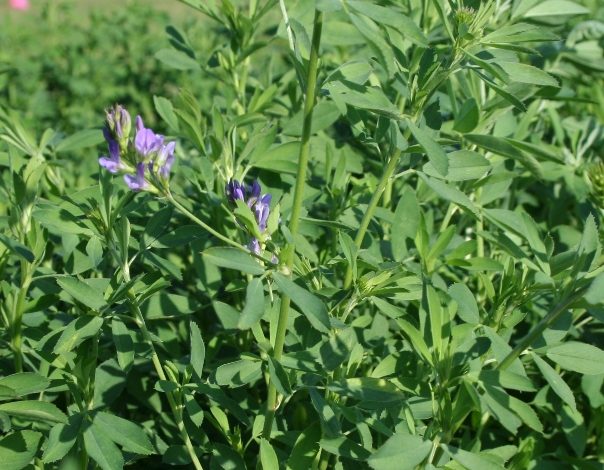TOP SECRETS BENEFITS OF Alfalfa LEAF
Alfalfa Has A High Content Of Bio-active Plant Compounds.

Alfalfa, also known as lucerne or Medicago sativa, is a plant that has been grown as feed for livestock for hundreds of years.
It was long prized for its superior content of vitamins, minerals and protein, compared to other feed sources.
Alfalfa is a part of the legume family, but it’s also considered to be an herb.
It seems to have originally come from South and Central Asia, but it has since been grown around the world for centuries.
In addition to being used as feed, it also has a long history of use as a medicinal herb for humans.
Its seeds or dried leaves can be taken as a supplement, or the seeds can be sprouted and eaten in the form of alfalfa sprouts.
Alfalfa is typically consumed by humans as an herbal supplement or in the form of alfalfa sprouts.
Because the leaves or seeds are sold as herbal supplements and not foods, there is no standard nutrition information available.
However, they are typically high in vitamin K and also contain many other nutrients, including vitamin C, copper, manganese and folate.
Alfalfa sprouts contain the same nutrients and are also very low in calories.
For example, 1 cup (33 grams) of alfalfa sprouts contains a mere 8 calories. It also contains the following
- Vitamin K: 13% of the RDI.
- Vitamin C: 5% of the RDI.
- Copper: 3% of the RDI.
- Manganese: 3% of the RDI.
- Folate: 3% of the RDI.
- Thiamin: 2% of the RDI.
- Riboflavin: 2% of the RDI.
- Magnesium: 2% of the RDI.
- Iron: 2% of the RDI.
A cup also contains 1 gram of protein and 1 gram of carbs, which comes from fiber.
Alfalfa also has a high content of bioactive plant compounds. They include saponins, coumarins, flavonoids, phytosterols, phytoestrogens and alkaloids.
Alfalfa contains vitamin K and small amounts of many other vitamins and minerals. It is also high in many bioactive plant compounds.
Alfalfa’s cholesterol-lowering ability is its best studied health benefit to date.
Numerous studies in monkeys, rabbits and rats have shown that it can lower blood cholesterol levels.
A few small studies have also confirmed this effect in humans.
One study of 15 people found that on average, eating 40 grams of alfalfa seeds 3 times per day decreased total cholesterol by 17% and “bad” LDL cholesterol by 18% after 8 weeks.
Another small study of only 3 volunteers also found that 160 grams of alfalfa seeds per day could decrease total blood cholesterol levels.
This effect is attributed to its high content of saponins, which are plant compounds known to lower cholesterol levels.
They do this by decreasing the absorption of cholesterol in the gut and increasing the excretion of compounds used to create new cholesterol.
The human studies done so far are too small to be conclusive, but they show promise for alfalfa as a treatment for high cholesterol.
Alfalfa has been shown to decrease cholesterol levels in both animal and human studies. This is probably because it contains plant compounds called saponins.
Table of Contents
Other Potential Health Benefits
There is a long list of traditional uses of alfalfa as a medicinal herb.
They include lowering blood pressure, acting as a diuretic, increasing breast milk production, treating arthritis and getting rid of kidney stones.
Unfortunately, most of these proposed health benefits have not yet been researched. However, a few of them have been studied to some extent.
Improved Metabolic Health
One traditional use of alfalfa is as an anti-diabetic agent.
A recent animal study found alfalfa supplements decreased high levels of total, LDL and VLDL cholesterol in diabetic animals. It also improved blood sugar control.
Another study in diabetic mice found that alfalfa extract lowered blood sugar levels by increasing the release of insulin from the pancreas.
These results seem to support the use of alfalfa to treat diabetes and improve metabolic health. However, this needs to be confirmed in human studies.
Relieving Menopause Symptoms
Alfalfa is high in plant compounds called phytoestrogens, which are chemically similar to the hormone estrogen.
This means that they can cause some of the same effects in the body as estrogen.
Phytoestrogens are controversial, but they may have several benefits, including easing menopausal symptoms that are caused by decreased levels of estrogen.
The effects of alfalfa on menopausal symptoms have not been extensively researched, but one study found that sage and alfalfa extracts were able to completely resolve night sweats and hot flashes in 20 women.
The estrogenic effects may also have other benefits. A study of breast cancer survivors found that women who ate alfalfa had fewer sleep problems.
However, more studies are needed to confirm these potential benefits.
Antioxidant Effects
Alfalfa has a long history of use in Ayurvedic medicine to treat conditions caused by inflammation and oxidative damage.
This is because alfalfa was thought to act as a powerful antioxidant, preventing damage caused by free radicals.
Several animal studies have now confirmed its antioxidant effects.
They found that alfalfa has the ability to reduce cell death and DNA damage caused by free radicals. It does this by both lowering the production of free radicals and improving the body’s ability to fight them
One study in mice even found that treatment with alfalfa could help reduce the damage caused by stroke or brain injury
Nevertheless, human studies are needed to confirm these effects. Animal studies alone do not hold much weight.
Alfalfa has many potential health benefits, but only a few have been scientifically evaluated. It may benefit metabolic health, menopause symptoms and have antioxidant effects, but human studies are needed.
Although alfalfa is probably safe for most people, it may cause harmful side effects for some individuals.
If You Are Pregnant
Alfalfa may cause uterine stimulation or contractions. Therefore, it should be avoided during pregnancy.
If You Take Blood Thinners
Alfalfa and alfalfa sprouts are high in vitamin K. Although this benefits most people, it can be dangerous for others.
High doses of vitamin K can cause blood-thinning medications, such as warfarin, to be less effective. Therefore, it’s important for people taking these medications to avoid big changes in their vitamin K intake.
If You Have an Autoimmune Disorder
There have been reported cases of alfalfa supplements causing the reactivation of lupus in some people.
And in one monkey study, alfalfa supplements caused lupus-like symptoms.
This effect is believed to be due to possible immune-stimulating effects of the amino acid l-cavanine, which is found in alfalfa.
Therefore, those who have lupus or some other autoimmune disorders are advised to avoid it.
If You Have a Compromised Immune System
The moist conditions required to sprout alfalfa seeds are ideal for bacterial growth.
Consequently, sprouts sold in stores are sometimes contaminated by bacteria, and multiple bacterial outbreaks have been linked to alfalfa sprouts in the past.
Eating contaminated sprouts can potentially make anyone sick, but most healthy adults will recover without long-term consequences. Yet, for people with a compromised immune system, an infection like this can be very serious.
Therefore, the FDA advises Trusted Source children, pregnant women, the elderly or anyone else with a compromised immune system to avoid alfalfa sprouts.
Alfalfa may be harmful for some people, including pregnant women, people taking blood thinners and those with an autoimmune disorder or a compromised immune system.
How to Add Alfalfa to Your Diet
Alfalfa supplements can be used in powdered form, taken as a tablet or used to make tea.
Because so few human studies have been done on alfalfa seeds, leaves or extract, it’s hard to recommend a safe or effective dose.
Herbal supplements are also notorious for not containing what is listed on the label, so be sure to do your research and buy from a reputable manufacturer.
Another way to add alfalfa to your diet is by eating it as sprouts. Alfalfa sprouts can be added to your diet in many ways, such as in a sandwich or mixed into a salad.
You can buy these at health food stores or sprout them at home. Here’s how:
- Add 2 tablespoons of alfalfa seeds to a bowl, jar or sprouter and cover them with 2–3 times the amount of cool water.
- Let them soak overnight or about 8–12 hours.
- Drain and rinse the sprouts well with cool water. Drain them again, removing as much water as possible.
- Store the sprouts out of direct sunlight and at room temperature for 3 days. Rinse and drain them thoroughly every 8–12 hours.
- On day 4, relocate the sprouts to an area with indirect sunlight to allow for photosynthesis. Continue to rinse and drain them well every 8–12 hours.
- On day 5 or 6, your sprouts are ready to eat.
However, be mindful of the high risk of bacterial contamination. It’s a good idea to take precautions to ensure the sprouts are grown and stored in safe conditions.
You can take supplements or eat alfalfa sprouts. Sprouts can easily be added to sandwiches, salads and more. You can either purchase sprouts or make your own at home.
People also take it for its high content of antioxidants, vitamins C and K, copper, folate and magnesium. Alfalfa is also extremely low in calories.
That being said, some people may need to avoid alfalfa, including pregnant women, people taking blood thinning medications or individuals with an autoimmune disorder.
Even though alfalfa needs to be studied a lot more, it does show a lot of promise.
For any important information please contact us Email GadgetsNg info@gadgetsng.com
[Button id="1"]



